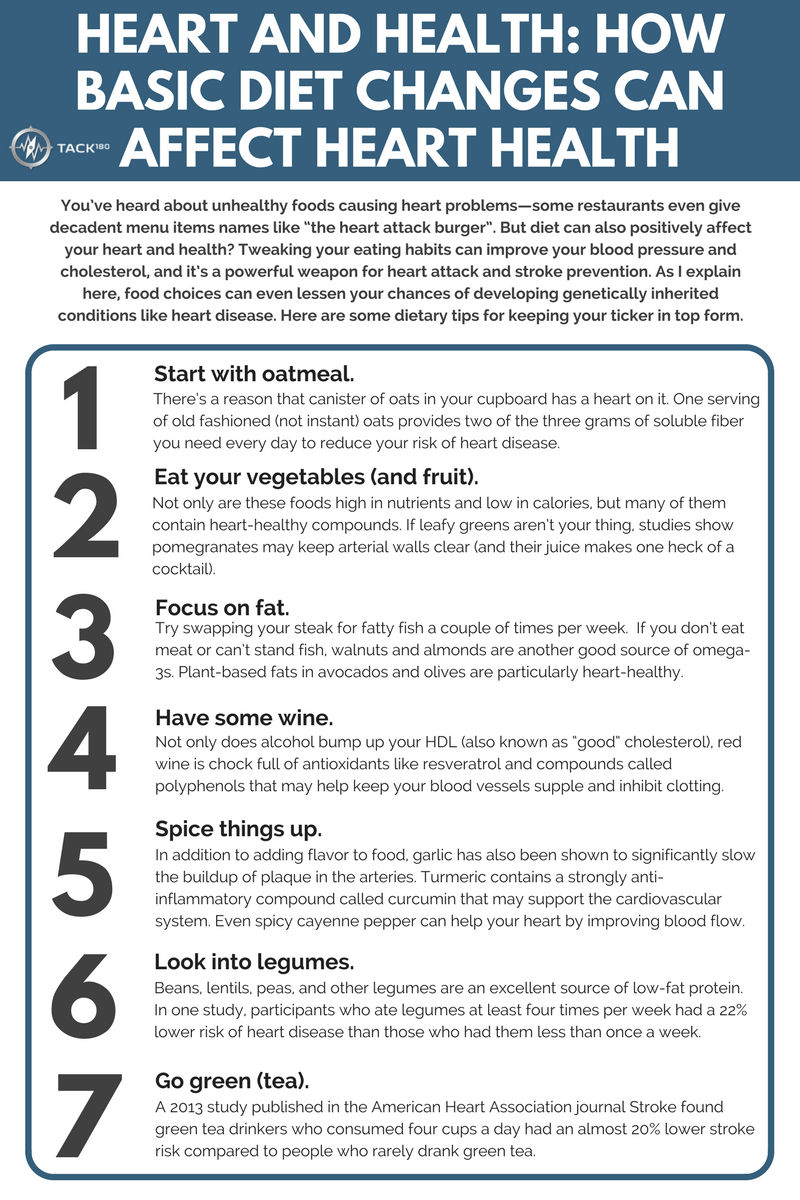You’ve heard about unhealthy foods causing heart problems—some restaurants even give decadent menu items names like “the heart attack burger”. But diet can also positively affect your heart and health? Tweaking your eating habits can improve your blood pressure and cholesterol, and it’s a powerful weapon for heart attack and stroke prevention. As I explain here, food choices can even lessen your chances of developing genetically inherited conditions like heart disease. Here are some dietary tips for keeping your ticker in top form.
Start With Oatmeal
There’s a reason that canister of oats in your cupboard has a heart on it. One serving of old fashioned (not instant) oats provides two of the three grams of soluble fiber you need every day to reduce your risk of heart disease. Whole grains in general can help lower your cholesterol, but research suggests oats are especially effective. In an analysis of 24 studies looking at blood lipids in people who ate whole-grain foods versus a control group who didn’t, an oat-heavy diet dropped cholesterol by an average of 6.5 points compared to control, while diets featuring other whole grains lowered cholesterol by about 4.6 points. An added bonus to breakfasting on oatmeal: all that fiber fills you up, making you less likely to grab some less healthy carbs a little later in the morning.
Eat Your Vegetables (and Fruit)
Not only are these foods high in nutrients and low in calories, but many of them contain heart-healthy compounds. Consider kale: topping the index of nutritionally-dense foods created by Joel Fuhrman, MD, bestselling author of Eat to Live, this powerhouse plant contains a protein called Nrf2 that can prevent plaque from sticking to your arteries. If leafy greens aren’t your thing, studies show pomegranates may keep arterial walls clear (and their juice makes one heck of a cocktail).
Focus on Fat
Once considered a nutritional villain, fat started making a comeback in 2013 after a high-profile study found people who ate a diet high in unsaturated fats drastically reduced their risk of cardiovascular disease. Since then, research supporting the heart and health benefits of “good” fat has continued to pile up. According to the Mayo Clinic, the omega-3 fatty acids found in cold water fish like salmon, sardines, and tuna have been shown to be particularly cardio-protective. Try swapping your steak—which contains “bad” saturated fat often linked to heart disease—for fatty fish a couple of times per week. If you don’t eat meat or can’t stand fish, walnuts and almonds are another good source of omega-3s. Plant-based fats in avocados and olives are particularly heart-healthy.
Have Some Wine
Not only does alcohol bump up your HDL (also known as “good” cholesterol), red wine is chock full of antioxidants like resveratrol and compounds called polyphenols that may help keep your blood vessels supple and inhibit clotting. Don’t go too crazy, but know that research supports the moderate consumption of red wine for heart health.
Spice Things Up
In addition to adding flavor to food, garlic has also been shown to significantly slow the buildup of plaque in the arteries. And turmeric, the bright yellow spice commonly found in Indian food, contains a strongly anti-inflammatory compound called curcumin that may support the cardiovascular system. Even spicy cayenne pepper can help your heart by improving blood flow.
Look Into Legumes
Beans, lentils, peas, and other legumes are an excellent source of low-fat protein. In one study, participants who ate legumes at least four times per week had a 22% lower risk of heart disease than those who had them less than once a week. Beans are also high in fiber, which has been shown to lower cholesterol.
Go Green (Tea)
When you’re not drinking red wine, have a cup of green tea. A 2013 study published in the American Heart Association journal Stroke found green tea drinkers who consumed four cups a day had an almost 20% lower stroke risk compared to people who rarely drank green tea. Prefer coffee? The same study showed just one cup a day produced a similar reduction in stroke risk. Researchers attribute green tea’s heart-healthy effects to catechins, compounds that help regulate blood pressure and improve blood flow.



